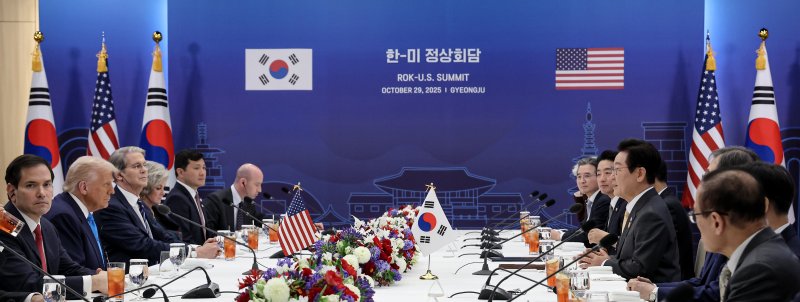Lee: "Supporting the Revival of U.S. Manufacturing" Trump: "Combining the Strengths of South Korea and the U.S. in Shipbuilding" [South Korea–United States summit]
- Input
- 2025-10-29 18:28:18
- Updated
- 2025-10-29 18:28:18

During his opening remarks at the summit, President Lee Jae-myung stated, "I sincerely welcome President Trump's second visit to the Republic of Korea." He praised Trump, saying, "Within just nine months of taking office, the President has played a remarkable role as a peacemaker, bringing peace to eight conflict zones around the world." Lee added, "I hope that this capability will also contribute to peace on the Korean Peninsula," and pledged, "I will faithfully serve as a pacemaker to help create such conditions."
President Lee Jae-myung emphasized the modernization of the ROK-US Alliance and cooperation in the defense industry. He noted, "The Republic of Korea is strengthening its independent defense capabilities through increased defense spending and advancements in the defense industry." He continued, "Currently, our defense expenditure is 1.4 times the gross domestic product (GDP) of the Democratic People's Republic of Korea (DPRK), and we will continue to expand it to reduce the defense burden on the United States." Lee also requested, "If the supply of nuclear-powered submarine fuel is permitted, we could deploy conventionally armed submarines for the defense of the Korean Peninsula, thereby lessening the burden on the United States Armed Forces (US Armed Forces)." On economic matters, he said, "South Korea will actively support the revival of U.S. manufacturing by increasing investment in the United States and expanding purchases of American products," adding, "Cooperation between our two countries will lead to a stronger alliance in practical terms."
In response, President Donald Trump remarked, "It is a privilege to work closely with the Republic of Korea," and stated, "I will continue efforts to engage in dialogue with Chairman Kim Jong Un to reduce tensions on the Korean Peninsula." He added, "Preparations are also underway for talks with President Xi Jinping, and I hope that the consecutive summits between South Korea, the United States, and China will lead to peaceful outcomes."
President Trump further emphasized, "Through the acquisition of the Philadelphia Naval Shipyard, South Korea and the United States can once again combine their strengths as shipbuilding powerhouses." He also highlighted, "With companies like Toyota Motor Corporation investing $10 billion in the United States, global corporations are returning to America."
On this day, President Lee Jae-myung presented President Trump with the Grand Order of Mugunghwa (Geumgwan), the highest honor in South Korea. Lee explained, "This is the first time this grand order has been awarded to a U.S. president, making it particularly meaningful." Additionally, President Lee gave Trump a specially crafted gift modeled after the Gyeongju Gold Crown.
The most contentious issue at the summit was undoubtedly the tariff negotiations. The two countries remained at odds over the method of executing South Korean companies' $350 billion investment in the United States and the specifics of tariff reductions. The U.S. continued to demand full cash prepayment, showing flexibility only on certain items. Meanwhile, the South Korean side maintained its stance that, "It is difficult to make concessions that could harm our national interests."
Kyuyoun Lee, Senior Secretary for Public Relations at the presidential office, made remarks before the summit that clearly reflected South Korea's negotiating stance. Lee stated, "There are advantages to reaching a quick agreement, but there are also benefits to not reaching one," adding, "We are approaching the negotiations with a focus on national interests."
"The substance is more important than the timing. If the agreement meets our national interest criteria, there is still a possibility of reaching a deal," he said. Oh Hyun-joo, the third deputy director of the National Security Office, also noted at a recent Foreign Correspondents' Club briefing that, "Negotiations are proceeding in a way that is commercially viable and beneficial to the Korean economy," but added that an immediate agreement would be difficult to achieve.
Within and outside the presidential office, the summit has been described as "not a failure, but a meeting that left unresolved issues." Initially, there were expectations that the tariff negotiations would be concluded at the APEC Economic Leaders' Meeting (APEC Summit), but the U.S.'s firm stance became a variable. The presidential office has emphasized substance over speed and principles over a quick settlement, and plans to coordinate specific implementation measures in future working-level negotiations.
west@fnnews.com Reporter